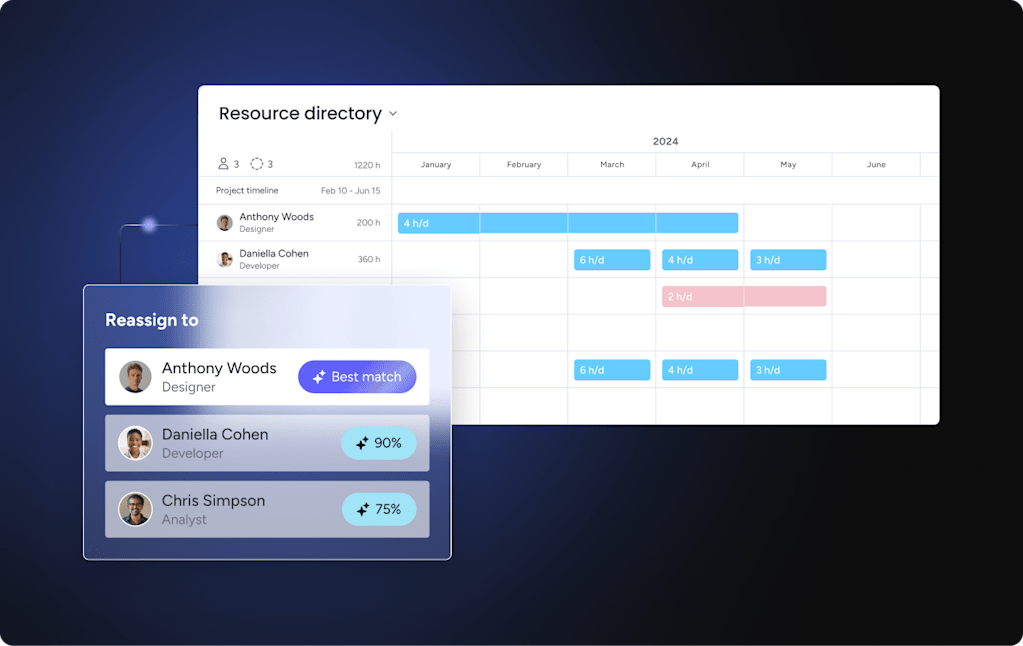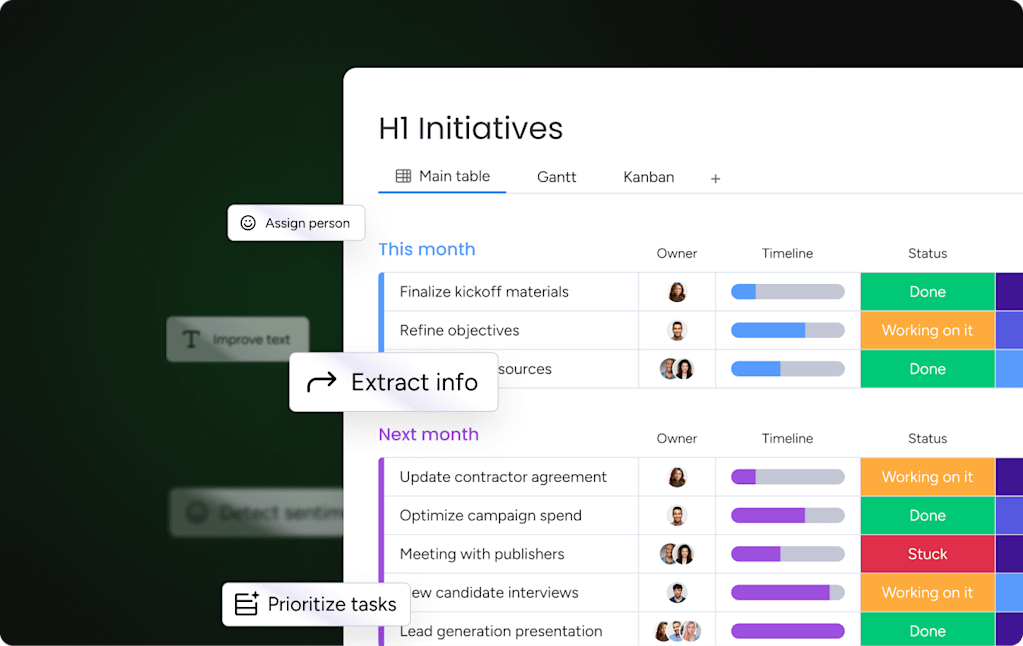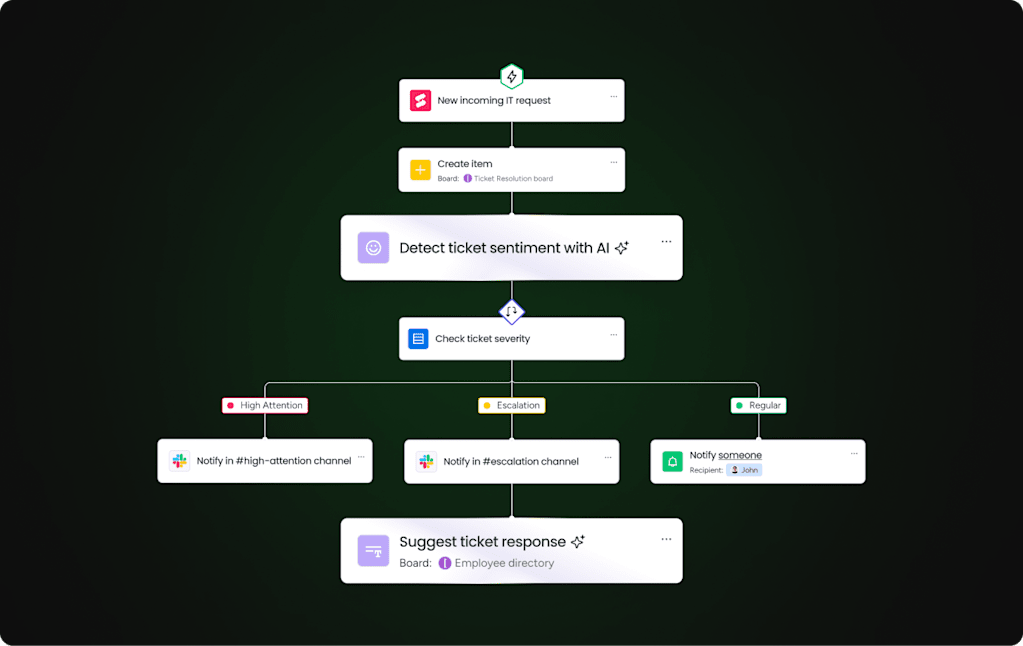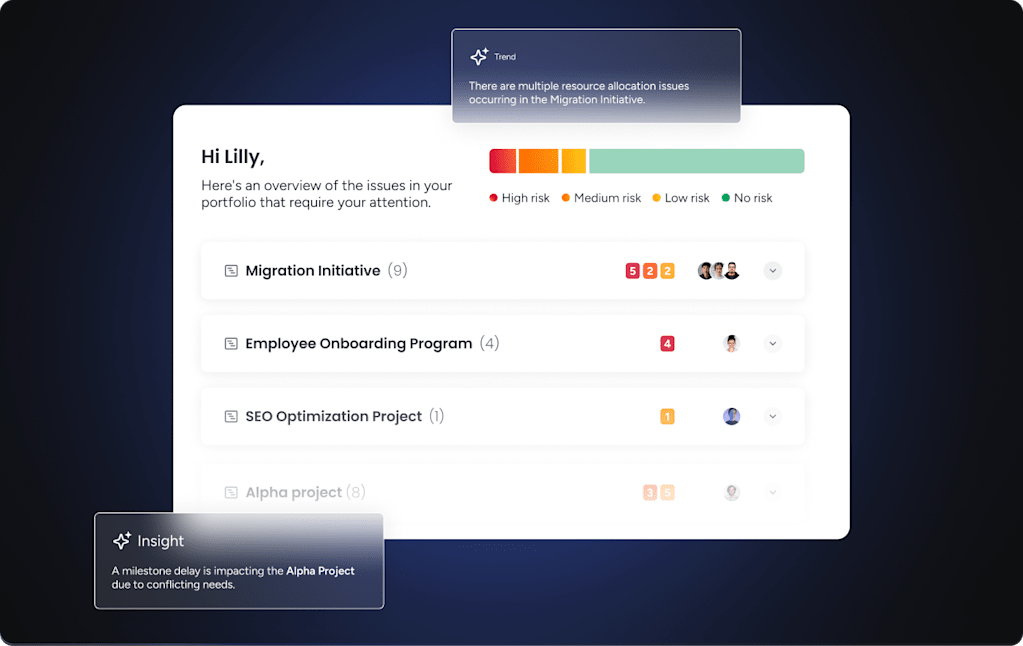As CMOs and marketing leaders face mounting pressure to do more with less, AI is no longer just a tool for improving their team productivity—it’s a strategic necessity. From streamlining operations to increasing visibility, AI enables marketing teams to automate unnecessary tasks and make data-driven decisions with confidence.
According to our research for the 2025 World of Work report,
Nearly half of employees at large enterprise companies indicate no AI usage at all.
The state of AI is evolving rapidly, with the tech sector (60%) and critical business units like IT (86%), marketing (77%), and R&D (72%) leading the charge. In addition to these insights, we also discovered that nearly half of employees at large enterprise companies (45%) indicate no AI usage at all.
For marketing leaders at the enterprise level, this means that AI adoption is now a key differentiator in maintaining a competitive advantage.
“The most effective CMOs and marketers will leverage AI to free up valuable time for their teams to work on strategic, high-impact initiatives—allowing them to focus on what directly drives business outcomes,” | Or Fridman, Product Group Manager at monday.com.
This blog post explores how marketing teams can harness AI to deliver transformative results across their organizations. You’ll learn how to:
- Strategically prioritize AI integration: Identify high-impact areas where AI can deliver immediate value—such as automating routine tasks, enhancing decision-making, or optimizing resource allocation.
- Automate campaign management: AI-powered tools can analyze performance data in real time, adjusting bids, budgets, and content placements for maximum impact without manual intervention.
- Focus on long-term competitive advantage: Embrace AI not just as a tool to reduce costs or improve efficiency, but as a key driver for innovation, improved customer experiences, and enhanced decision-making that will position your enterprise for future success.

Maximizing efficiency with AI-powered automations
When used effectively, AI can drive operational efficiency and unlock the true potential of marketing teams. By automating routine tasks, AI frees up time for your teams to think more creatively, develop long-term strategic planning, and drive forward the projects that matter most. As a marketing leader, it’s critical to understand the broader organizational benefits and ensure your teams are leveraging AI to its fullest potential.
Discover how to automate smarter, work faster, and make better decisions using monday AI Blocks, with a short lesson in monday academy. Learn how to use monday’s AI Blocks.
Key applications for enterprise leaders include:
- Optimizing scheduling and resource allocation: AI can analyze complex project timelines, dependencies, and team availability to automatically optimize schedules and eliminate bottlenecks. This enables teams to prioritize high-value projects, ensuring alignment with business goals and key performance indicators.
- Streamlining reporting and documentation: By summarizing key information across multiple initiatives, you can get the bottom line up front, allowing you to focus on high-priority tasks, addressing critical issues, and aligning teams around key priorities.
- Proactive risk management: Although you can’t be everywhere at once, AI can. AI tools can scan hundreds of projects to identify potential risks—such as financial overruns, missed deadlines, and more—long before they occur, enabling your teams to find solutions ahead of time.
Next steps for implementation:
- Start small: Don’t feel the need to make sweeping changes overnight. Identify a few key places that you believe could be automated or assisted and begin experimenting with different solutions and use cases.
- Invest in training: Equip your teams with the skills needed to successfully adopt AI tools. Provide the necessary training to ensure they can effectively integrate AI into their workflows and overcome resistance to new technologies. Create a culture that embraces innovation and continuous improvement.

Enhancing standardization in the age of AI
AI can also help marketing teams standardize processes by automating workflows, enforcing brand consistency, and streamlining approvals. By reducing manual effort and ensuring that every campaign follows predefined guidelines, AI enables teams to scale efforts without sacrificing quality. These solutions also provide real-time insights, helping marketers quickly identify and adjust underperforming strategies to stay aligned with business objectives. As a result, teams can execute campaigns faster, more efficiently, and with a higher degree of precision, ultimately driving stronger and more predictable results.
AI-driven standardization strategies:
- Real-time reporting and insights: AI consolidates data automatically to eliminate the need for pulling together manual reports, providing a single source of truth for performance tracking across even the most complex campaigns.
- Streamlined content workflows: AI tools are able to create consistent messaging across multiple channels, ensuring brand guidelines are being followed from start to finish.
- Automated task management: AI automations are able to instantly summarize next steps and action items, track important follow-ups, and identify potential risks to timelines, keeping marketing teams aligned on the progress of key initiatives.
Next steps for implementation:
- Identify collaboration pain points: Assess areas where communication inefficiencies exist and introduce AI tools to address these issues.
- Foster AI adoption across teams: Encourage other leaders to integrate AI-driven tools into their daily workflows and ensure they are trained to use them effectively.
AI-driven decision-making: empowering your teams with data-driven insights
AI excels at processing large datasets and providing actionable insights in real-time. When wielded properly, AI is a tool that can significantly enhance decision-making by turning complex data into actionable intelligence. This enables CMOs and other marketing leaders to make faster, more informed decisions and respond quickly to market dynamics or resource constraints.
Key ways AI can improve decision-making include:
- Scenario planning and risk assessment: AI can quickly analyze multiple variables, providing a clearer view of risks and opportunities. Marketing team leads can then allocate resources more effectively, prioritize high-impact projects, and identify new areas for growth.
- Real-time monitoring and alerts: With continuous monitoring, AI can alert marketing teams to issues before they become critical—whether related to project timelines, spending, or bandwidth.
- Data-driven strategic insights: AI enables marketers to sift through complex data sets and identify patterns or trends that may not be immediately visible, allowing for more accurate forecasting and strategic planning.
- OKRs and goal alignment: AI can help set and track the progress of OKRs in real-time across teams, ensuring everyone is working toward the same strategic goals, and providing insights about adjustments that are needed to stay on target.
- Optimizing resource allocation: By matching team skills and availability with project requirements, AI helps marketing leaders ensure that the right resources are assigned to the right tasks, improving overall productivity.
Next steps for implementation:
- Establish clear metrics: Define the KPIs that will measure the success of AI implementations, such as time savings, cost reductions, and improved decision-making speed.
- Drive cross-functional collaboration: Ensure that AI initiatives are aligned across your entire organization to ensure you’re maximizing visibility and empowering collaboration beyond just your department.
Leading through the challenges of AI adoption
As AI adoption grows, CMOs and other marketing leaders must be prepared to navigate the challenges that come with it. Effective leadership is critical to overcoming these hurdles and ensuring AI initiatives deliver long-term value.
- Skill gaps: AI adoption often requires specialized expertise that may not be readily available in-house. Leaders should consider upskilling existing teams or hiring external talent to bridge these gaps.
- Change management: Introducing AI tools requires strong leadership to manage the organizational shift. It’s crucial to guide teams throughout the transition, providing training, communication, and support to overcome resistance and maximize AI adoption.
- Security and trust: As AI adoption increases, ensuring data security and building trust are crucial. Leaders must implement strong cybersecurity measures, ensure compliance with data privacy laws, and address AI biases. Transparent AI practices and clear ethical guidelines help maintain stakeholder confidence and mitigate risks.
How monday AI can power better marketing efforts
For CMOs and marketing leaders, monday AI offers seamless integration into workflows, empowering teams to collaborate faster and deliver results more effectively.
To explore how monday AI can improve your team’s productivity and help your enterprise stay competitive, visit monday.com/ai.
Ready to drive transformative results through AI?



